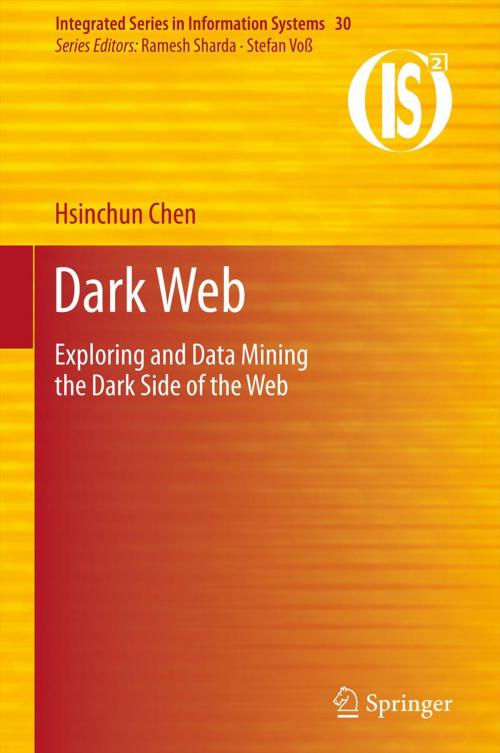Dark Web
Exploring and Data Mining the Dark Side of the Web
Business & Finance, Industries & Professions, Information Management, Nonfiction, Computers, Database Management, General Computing| Author: | Hsinchun Chen | ISBN: | 9781461415572 |
| Publisher: | Springer New York | Publication: | December 17, 2011 |
| Imprint: | Springer | Language: | English |
| Author: | Hsinchun Chen |
| ISBN: | 9781461415572 |
| Publisher: | Springer New York |
| Publication: | December 17, 2011 |
| Imprint: | Springer |
| Language: | English |
The University of Arizona Artificial Intelligence Lab (AI Lab) Dark Web project is a long-term scientific research program that aims to study and understand the international terrorism (Jihadist) phenomena via a computational, data-centric approach. We aim to collect "ALL" web content generated by international terrorist groups, including web sites, forums, chat rooms, blogs, social networking sites, videos, virtual world, etc. We have developed various multilingual data mining, text mining, and web mining techniques to perform link analysis, content analysis, web metrics (technical sophistication) analysis, sentiment analysis, authorship analysis, and video analysis in our research. The approaches and methods developed in this project contribute to advancing the field of Intelligence and Security Informatics (ISI). Such advances will help related stakeholders to perform terrorism research and facilitate international security and peace.
This monograph aims to provide an overview of the Dark Web landscape, suggest a systematic, computational approach to understanding the problems, and illustrate with selected techniques, methods, and case studies developed by the University of Arizona AI Lab Dark Web team members. This work aims to provide an interdisciplinary and understandable monograph about Dark Web research along three dimensions: methodological issues in Dark Web research; database and computational techniques to support information collection and data mining; and legal, social, privacy, and data confidentiality challenges and approaches. It will bring useful knowledge to scientists, security professionals, counterterrorism experts, and policy makers. The monograph can also serve as a reference material or textbook in graduate level courses related to information security, information policy, information assurance, information systems, terrorism, and public policy.
The University of Arizona Artificial Intelligence Lab (AI Lab) Dark Web project is a long-term scientific research program that aims to study and understand the international terrorism (Jihadist) phenomena via a computational, data-centric approach. We aim to collect "ALL" web content generated by international terrorist groups, including web sites, forums, chat rooms, blogs, social networking sites, videos, virtual world, etc. We have developed various multilingual data mining, text mining, and web mining techniques to perform link analysis, content analysis, web metrics (technical sophistication) analysis, sentiment analysis, authorship analysis, and video analysis in our research. The approaches and methods developed in this project contribute to advancing the field of Intelligence and Security Informatics (ISI). Such advances will help related stakeholders to perform terrorism research and facilitate international security and peace.
This monograph aims to provide an overview of the Dark Web landscape, suggest a systematic, computational approach to understanding the problems, and illustrate with selected techniques, methods, and case studies developed by the University of Arizona AI Lab Dark Web team members. This work aims to provide an interdisciplinary and understandable monograph about Dark Web research along three dimensions: methodological issues in Dark Web research; database and computational techniques to support information collection and data mining; and legal, social, privacy, and data confidentiality challenges and approaches. It will bring useful knowledge to scientists, security professionals, counterterrorism experts, and policy makers. The monograph can also serve as a reference material or textbook in graduate level courses related to information security, information policy, information assurance, information systems, terrorism, and public policy.















